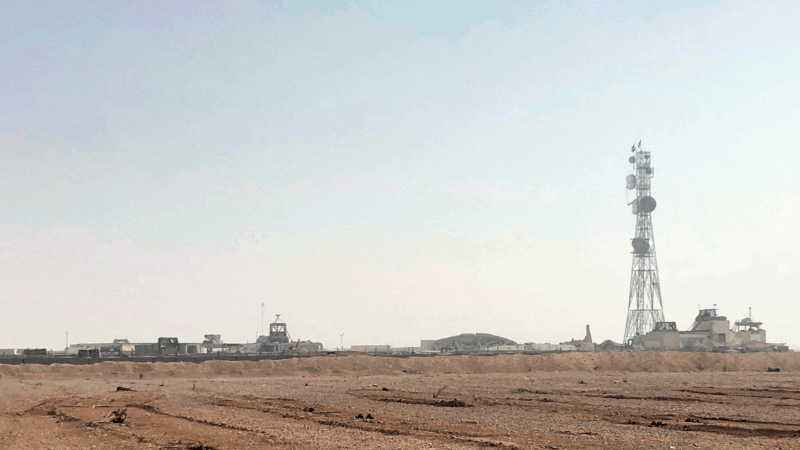Protecting Alabama’s Innocent, Part 2
The downtown office of the Department of Human Resources is a cold, desolate looking place. Fluorescent lights flicker overhead, casting a sterile glow over the room, with its hard plastic chairs and cool tile floor. You can see PBS kids programming through the snow on the t.v., parenting magazines are scattered about the battered magazine rack. The adults sitting in the room look as if they want to be anywhere but here. And that’s increasingly the attitude of some of the people who work here too.
 “Right now, we haven’t received a merit raise in over a year, those were cut. Our cost of living raises have been frozen.”
“Right now, we haven’t received a merit raise in over a year, those were cut. Our cost of living raises have been frozen.”
Kenneth Gowens is a DHR social worker and the night side supervisor. He says morale is pretty low among his colleagues right now.
“So what you have is workers coming in to work in a system that is much more stressful, much greater liability, for, you know, several thousand dollars less than they could be making in the private sector, either as a medical social worker or something else.”
It’s been a tough year for Jefferson County DHR. Not only do they have to worry about budget cuts, an increasing caseload and losing their jobs; four Birmingham area children have died as the result of abuse since July, most recently a two-year-old girl died a day before her 3rd birthday. DHR supervisor Tracey Grey says they just have too many children to watch over.
“If that was the only child that I had to ensure safety for, I could probably do it. But it’s not, it’s one child in 60, or 1 child in 100.”
DHR Commissioner Page Walley says they’re trying to improve, but they can only do so much when money’s tight. The department’s budget actually went up 8-percent this year and it could go up another 5 million dollars next year. But Walley says that’s not nearly enough.
“With the budget situation we’re probably going to be fortunate if we can hold steady in the personnel and the resources to carry through on our child abuse and prevention investigations.”
UAB Political Scientist Chris Stream says Walley’s department is lucky its actually seen an increase in funding. Stream says social services are usually the first place states look to trim budget fat.
“They would be a much larger target because in these tough times those groups that do not have the strong lobby, that do not have the power interest group membership behind them, that’s where we’re gonna see cuts and that’s where we’re gonna see reductions.”
One thing that’s helped DHR keep its funding is the R.C. Consent Decree. The R.C. case came about in the late 1980’s when a foster child sued DHR over his treatment while in the department’s care. The state lost the case and a federal monitor was brought in to make sure DHR fixed its child welfare system — which the state has done. Other states are now encouraged to model their systems after Alabama’s. But social worker Tracey Grey says she and her colleagues worry that will change because Walley wants to take the feds out of the picture.
“Everyone is concerned, on top of the stress, that as soon as the federal government steps out they’re going to take our money. We are all very concerned that one of the pushes to get the federal court monitors out of our lives is so that they can cut.”
Walley says the idea he wants the monitor out so he can then cut funding is ridiculous.
“We have to realize that R.C. is a 13-year-old model and if you had a car that was 13 years old, or a home that was 13-years-old, if you had anything that was 13 years old then it’s probably the reality that you can design something better, purchase something better, practice in new or better ways that would help deliver better outcomes than you’re even receiving now.”
But Political Scientist Chris Stream says the caseworkers’ fears are valid.
“On the one hand state control means the state can better manage its finances. But the fear, particularly for those who work in that area are that well, that federal safety net allows us to maintain at least a low level of funding and support and without that safety net will states just race to the bottom?”
James Tucker is one of the attorneys representing the plaintiffs in R.C.
“It is clear that ultimately the federal court will return control of the department to the state as it should, I think that’s why the timing and the method by which that return is made is crucial.”
And he’s not sure now’s the right time for that return.
“Over the 16 years since the case was filed in 1988, the department of human resources has made notable progress statewide, however there are still important issues that need to be addressed and that have not been addressed.”
Issues like keeping sibling groups together and offering more individualized service, instead of treating every case the same way.
Democratic Senator Sundra Escott of Birmingham chairs the committee that oversees DHR. Escott says lawmakers are going to have to find funding for the department somewhere, if they don’t, it could undo the reforms made since the R.C. case.
“I think if we don’t come up with revenue we will see something ten or 15 years down the road where we’re still havin’ this rippling affect of trying to catch up again and that’s going to be very damaging.”
Alabamians had a chance to approve more money for social services last fall when Amendment One was up for vote. It would’ve generated 1.2 billion dollars in state revenue but more than 2/3 of voters said no to the measure. And the state now faces a 675 million dollar budget shortfall. Political Scientist Chris Stream says things aren’t looking much better for next year.
“There’s a lot of uncertainty out there still, the future state fiscal picture is still very much cloudy right now and uncertain right now.”
But DHR Commissioner Page Walley says he remains optimistic about the future.
“It’s going to get better. It’s going to not get better this year, it may not get better next year. But we’re going to have brighter days ahead.”
Social workers like Tracey Grey and Kenneth Gowens can only hope that Walley is right and those brighter days aren’t too far away.
For U.S. pairs skater Danny O’Shea, these Olympics are 30 years in the making
Danny O'Shea turned 35 at his first Olympics, after three decades of skating and two reversed retirements.
Want a mortgage for under 3% in 2026? Meet the ‘assumable mortgage’
Low mortgage rates from the COVID era might still be attainable for homebuyers, if they find the right house and have the cash.
Epstein files fallout takes down elite figures in Europe, while U.S. reckoning is muted
Unlike in Europe, officials in the U.S. with ties to Epstein have largely held their positions of power.
Four people on NASA’S Crew-12 arrive at the International Space Station
The crew will spend the next eight months conducting experiments to prepare for human exploration beyond Earth's orbit.
American speedskater Jordan Stolz wins second Olympic gold with 500-meter race victory
With the win, Stolz joins Eric Heiden as the only skaters to take gold in both the 500 and 1,000 at the same Olympics.
US military reports a series of airstrikes against Islamic State targets in Syria
The U.S. military says the strikes were carried out in retaliation of the December ambush that killed two U.S. soldiers and one American civilian interpreter.






